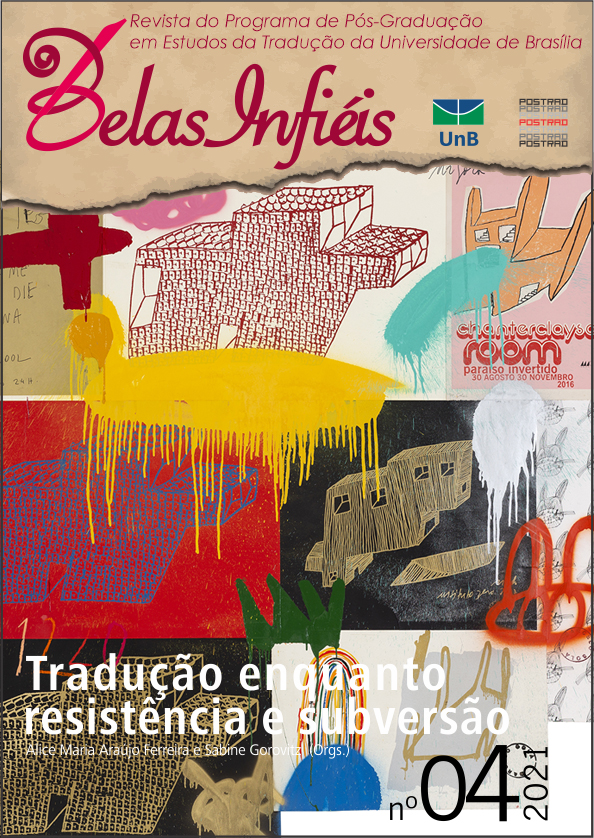Traduire au risque de l'interprétation : demander asile ou exil dans la langue de l'autre
DOI :
https://doi.org/10.26512/belasinfieis.v10.n4.2021.36301Mots-clés :
Traduction et subversion ; demandeur d'asile ; interprétation communautaire ; immigration.Résumé
Trata-se da tradução do texto Traduire au risque de l'interprétation : demander asile ou exil dans la langue de l'autre, escrito pela autora Claire Gillie para o livro organizado por Arnold CASTELAIN, Traduction et migration: enjeux éthiques et techniques, em 2020. Nele, Gillie evoca como é possivel traduzir o Outro, o solicitante de refúgio e de asilo, e o desamparo de alguém que "perdeu tudo" - até seu porto de origem - e que chega nume terra que supostamente "acolhe seu desamparo", enquanto Outro, portador social de uma língua outra.
Téléchargements
Références
GILLIE, Claire. Traduire au risque de l'interprétation : demander asile ou exil dans la langue de l'autre, publicado em CASTELAIN, Arnold. Traduction et migration: enjeux éthiques et techniques. Presses de l’Inalco, 2020.
Assoun, P.-L. (2013). La voix jalouse et le ‘feu dévorant’ ? L’inconscient monothéiste”. In C. Gillie (Org.), La voix sur les Braises, Simpósio Voix/Psychanalyse 2012. Solipsy.
Benjamin, W. (1971). Mythe et violence (v. 1), Denoël.
Benjamin, W. (1971). « La tâche du traducteur ». Mythe et violence, v. 1, p. 261-262, Denoël.
Bonaparte, M. (2004). Topsy, les raisons d’un amour (S. Freud, Trad.). Edition Payot et Rivages. (Obra originalmente publicada em 1937)
Delbe, A. (1995). Le stade vocal. L'Harmattan.
Ferré, L. (1970). Poète, vos papiers [Música]. On Amour Anarchie. Barclay Records.
Freud, S. (1985). L'inquiétante étrangeté et autres essais, Folio essais.
Freud, S. (2010). O futuro de uma ilusão (P. C. Endo, E. L. de Sousa, Ensaio biobibliográfico; R. Zwick, Trad.). L&PM. (Obra originalmente publicada como Das Unheimliche, em 1919)
Freymann, J.-R. (2008). Passe, un père et manque. Eres.
Gillie, C. (2010). Les voix muettes de l’opéra. Colloque de musicothérapie Paris V-2009, Revue française de musicothérapie.
Gillie, C. (2011). Voix flagellées, voix transfigurées ; la condamnation vocale à perpétuité. Simpósio Anthropologie et Psychanalyse/Clinique de La Marge, Grécia.
Gillie, C. (2013). Le sujet de l'inconscient. Un éternel demandeur d'asile. Journée d'étude EPCI Le retour du religieux. Editora EPCI.
Gillie, C. (2014). La traduction à l'épreuve de l'inconscient ; destins de l'allemand freudien. Figures de la psychanalyse, 28, 123-137. https://doi.org/10.3917/fp.028.0123
Gillie, C. (2016, 4 de abril). L’effet Babel dans l’entre-deux langues. Les enjeux actuels de la traduction, Séminaire Traduction et Transdisciplinarité, Paris.
Gillie, C. (2016, outubro). La voix gorge de Pigeon. In C. Klein-Dallant (Org.), De la voix parlée au chant. Editions Klein-Dallant.
Gillie, C. (2017) Retours à la lettre freudienne. Contours et détours d'une langue à l'autre. In E. B. Rossi, P. H. Tavares, W. C. Costa (Org.), Psicanálise entre línguas. 7 Letras.
Gillie, C. (2017, 17 de junho). La traduction ; du contact fugitif entre les langues aux douleurs de l’enfantement. L’opération detraduction et son enjeu. A partir de l’oeuvre de G.A. Goldschmidt, Simpósio Espaço Analítico. Paris.
Green, J. (2004). Le langage et son double. Fayard.
Julien, P. (2008). La psychanalyse et le religieux: Freud, Jung, Lacan. Paris: Cerf.
Lacan, J. (1958). Écrits. Paris: Seuil.
Laplanche, J. (1997). Le primat de l’autre en psychanalyse. Flammarion.
Poizat, M. (1998). Variations sur la voix. Métailié.
Toutin, C. (1984). A travers les langues. Littoral [Traduction de Freud, transcription de Lacan], 13, 43-52.
Téléchargements
Publié-e
Comment citer
Numéro
Rubrique
Licence
(c) Tous droits réservés CC BY 2021

Cette œuvre est sous licence Creative Commons Attribution 4.0 International.
Copyright Statement
Given the public access to this journal, the texts are free to use but requires the recognition of the original authorship and initial publication in this journal to be properly stated.
The journal allows the use of works published for non-commercial purposes, including the right to submit the work to publicly accessible databases. Published contributions are the sole and exclusive responsibility of the author(s).
- When submitting papers to be evaluated by the Belas Infiéis journal, the author(s):
- Declare that the contents of the contributions are original and of their original creation, being entirely responsible for their content if there is an objection by third parties.
- Claim to be aware that they should not commit academic plagiarism.
- Declare that the manuscript has not been published, completely or partially, in Portuguese or another language. If it is a translation it should be submitted to the Translated Articles section.
- Declare that the manuscript is not being evaluated by other journals.
- Declare that the manuscript was not submitted to another journal simultaneously.
- Commit(s) to inform the journal of any kind of error or inaccuracy in their contribution (published, in evaluation or in editing) and to collaborate with the editors to make due corrections of the article (when in evaluation or editing) or erratum/retraction (after publication).
- Declare that there is no conflict of interest regarding the published work.
- Authorize its release if it is accepted for publication without any kind of monetary compensation.
- Agree to assign non-exclusive rights to publication to the magazine, remaining free to make their contribution available in other media as long as the publication of the first version in Belas Infiéis magazine is mentioned. They also authorize Belas Infiéis to assign their texts for reproduction in content indexers, virtual libraries and similar platforms.
- Maintain copyright and grant the journal the right of first publication, the work being licensed under theCreative Commons Attribution License.
- Is/Are allowed and encouraged to publish and distribute their work online after the editorial process, which may increase the impact and citation of the published work.
- Authorize the editorial team to make textual adjustments and to adapt the article to the publication rules, when necessary.



















